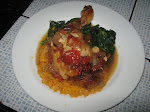MANGOES, FINALLY I GET MANGOES (From the July, 2010 issue of Dominical Days)
This mango season that has all changed. Maybe it was that I became more committed to working with local ingredients and knew that they were an essential part of a tropical kitchen repertoire. Maybe it was the smell of them in my car on a warm day as their honeyed juices warmed, and maybe it was licking my fingers after cutting them for my “Salsa de la Jungla” and discovering that each mango had a slightly different yet equally powerfully seductive flavor.
This is the year that I discovered a “signature” sauce based on mangoes. This is the year I made mango vinegar, numerous mango salsas, mango-mustard glaze and mango-coco ice cream. I found that the mango could stand up to the acid of mandarina, the bite of ginger, the heat of habaneros and the sinus opening blast of hot mustard.
I have paired mango this year with chicken, fish and pork. Each of those meats picks something up from the inherent mango sweetness and if they are cooked on the grill, they give something back with the flavor of smoke and charcoal. A crusty pork loin or crisp skinned chicken thigh brushed with a mango glaze and then pulled from the grill is barbecued poetry.
The season is almost over but there are still sticky sweet mangoes at the Feria. Buy and use them now or puree the flesh and use it later. But however you use them, don’t forget to lick your fingers.
MANGOES AND WHAT TO DO
So now, with any luck, I’ve made you want to run out and grab a few mangoes, and in an “end of the season” burst of creativity, have your way with them. I buy them with three criteria in mind; feel, smell and color. I want my mango to have some give to it when I squeeze it, but not just in one soft place. I want the smell to be aromatic and sweet. And I want the color to be a lovely hue of red running into gold over the entire fruit.
Cut off enough of either end so that it will stand up on its own.Using a paring knife, from top to bottom take the skin off in longnarrow strips. When the peel is gone, stand the mango up again and look at it from the top. It should be ovate, rather than round. The longest sides of the oval are where the greatest amount of the flesh is. Using the blade of the knife, find the seed and slide the knife downward, staying as close to the seed as possible. The flesh should come away in a long even piece. Continue around the mango, working the knife down the pit. You will have two larger pieces of mango and several other long narrow pieces. You are ready to cook.
MANGO MUSTARD GLAZE
Flesh of One Ripe Mango
Juice of 2 Mandarinas
½ Cup Orange Juice
½ Cup Tapa Dulce, or Brown Sugar
1 tsp grated fresh ginger
2 TBS Dijon Mustard
In a stainless or non-corrosive pot, put all the ingredients except the mustard. Bring up the heat to a low boil and then reduce the heat and simmer for 30 minutes, stirring to break up the pieces. Remove from heat and stir in the mustard. Use as a glaze for pork, chicken or fish. Use it now, or chill and reserve.



























































No comments:
Post a Comment